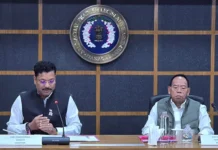[ Tokong Pertin ]
When an Adi warrior is seen in his full war attire, the first thing to catch the eye is the headgear – the Dumlup or, specifically, Lupro (Dumlup + aro).
Decorated with one or two wild boar tusks on the forefront or frontal sides called Rayi, a bear skin and with the fur intact, tied from side to side overhead, called Lummer, and blood-red Yak tail called Baaling (Aabang + Ya + ling) on the back side. The lupro protects the warrior from a flying poisonous arrow or a chop of a sharp sword. When it is used in entertainment or on festivities, a hornbill beak is also tied on the forehead as decoration. Lupmer makes the warrior appear more smart and ferocious.
However, when we speak the Adi language, the voiced consonants become voiceless consonants, and vice versa. Therefore, the consonants ‘P’ and ‘B’ become ‘M’ in speech. So Lupmer is pronounced as Lummer.
Yes, I am talking of my Pai (youngest paternal uncle), Lummer Dai, whose parents, Jobu Dai and mother Komsak Dai, were probably proud of having begotten a male child and loved him as a decorative piece in the thinly populated Dai clan in Siluk village. They, therefore, named him Lummer, or the decorative piece on the hat or the feather on the hat. He proved worthy of his name as he was the only school going boy from among the children of the Dai clan of Siluk village in those days.
Lummer Dai was a born writer who started writing from his school days. At the time when Lummer Dai started writing, Assamese was the medium of instruction in the schools of the then NEFA, and, being the language spoken by the native people of Assam, with whom the different tribes of the then NEFA had more access than other communities, naturally, it was a lingua franca for verbal exchange among the different tribes of the NEFA, which has continued upto even the present day, although the use of the Assamese language is diminishing day by day with Hindi replacing it fast.
As Assamese was read and spoken in the schools, the teachers of those days encouraged students to write articles, poems, fiction and even dramas in Assamese.
Daiji’s capability as a writer, be it in Assamese or English, was unique, authentic and extremely original. Though much have been written in this regard, words are not enough to describe it to its fullest glory. We at the Echo of Arunachal strive hard to live up to the great man’s reputation, though it is hard showing a candle to the sun. His place can never be replaced. We feel gratified for working, learning and blooming under his stewardship.
He was simple to the core, gentle and soft-spoken, for he was a soul with a difference, a creative spirituality free from moral outrages. He was Lummer Dai, more popular in undivided Assam than his own state, Arunachal Pradesh. His life can be seen and understood as a succession of divergent problems, which are inevitably countered and have to be coped with the same way. They are refractory to mere logic and discursive reason, and constitute, as it were, a strain-and-stretch apparatus, developing the whole man – which means to develop the man’s supra-logical faculties.
I was fascinated by Lummer Dai’s achievement because he not only wrote a novel and published it, but his name was already known to the reading public, so widely popular his books became. Think of the bravery of a young writer, still in his teens, jostling with mature and established writers for a place in the sun in a language not naturally his own, yet adopting and mastering it like a natural born. His dexterity in handling an inventive prose in simple, economic expression, and his ability to weave an attractive story with distinctive characters drawn from an ethnic society in motion show how keen his observation was. Perhaps his success in impressing a variety of readers lies in this ability.
An unpretentious and imperturbable personality, Dai used to talk in writing. He put his thinking in his words. Each of the lines that rolled out his ADD Gel pen carried a decibel thousand times higher than the words he uttered. That is why he was a powerful writer. He believed his editorials made a difference and influenced government policies. His knowledge of history and anecdotes was, of course, amazing. He would never forget to relate a current happening with history, which was often reflected in his editorials. At 62 years, Dai’s error-spotting calibre made me wonder what might have been his memory when he was young. And his arguments were well-reasoned and disarmingly convincing. A sincere, intelligent and simple personality since his childhood, late Dai loved works. He died working.
The simple village boy, Lummer Dai, became a celebrity in the Assamese literary circle. With the publication of Koinar Mulya or Bride Price, Dai began to be counted with the best in the business of those times. It was not surprising that the Assam Sahitya Sabha did not take too long to recognize the contributions of a non-Assamese to Assamese literature, though stalwarts Jyoti Prashad Agarwal, Rabindra Sarkar and Manjit Sing, among others, had already enriched it.
Ironically, the unknown boy from an unknown village is still, more or less, unknown in the state, which, by the way, is known to many outsiders just because of him. It is not that he expected anything from anybody. He believed in simplicity and played his part as a perfectionist. He believed in his work, not in the results. Fortunately, he lives on in his works, and the works speak volumes about the great man from the small unknown village of Siluk.
Late Pai Lummer was an unsung literary ambassador of Assamese literature from Arunachal to Assam. The literary seed in him was sown by Kali Prasad Borthakur (then serving as an Assamese teacher in Pasighat) and later nurtured by Mahandra Borthakur, and the editor of Ramdhenu, Birendra Kumar Bhattacharya. Their role in shaping late Dai’s creative writing is worth a mention. The contribution – in the shape of a marriage between language and culture – by the pioneer teachers from Assam who served in Arunachal Pradesh, is indeed remarkable. Even today, the Assamese culture and language are deeply rooted in many interior parts of Arunachal Pradesh. Many youngsters can sing popular Assamese songs and speak the Assamese language. Though our pronunciation and accent may be different from that of Assam’s Assamese, we do sing and speak the same Assamese songs and the Assamese language of great ‘Hunar’ Asom, and we’ve made Assamese our lingua franca in many places.
Rekindling of the ray of love and friendship between the people of Arunachal and Assam is the need of the hour. Late Dai’s literary works received late recognition in the literary world, but as the saying goes, better late than never, and, in time, late Pai got love and affection from thousands of Assamese admirers connecting with the people of our state through his literary works. The physical and moral support extended to late Dai and his family members by the people of Assam when he was undergoing treatment at Down Town Hospital, in Guwahati, and also after his demise, is a tribute to their emotional recognition. Theirs was a truly touching gesture. The people of Arunachal cannot forget the support extended to one of our own sons and his family in distress. This show of solidarity proves yet again that had Pai Lummer received timely recognition and encouragement, he could have scaled many more literary heights in popularizing the Assamese literature. But the almighty willed otherwise.
To me, late Lummer Dai was a great scholar, novelist, philosopher and a champion of women’s causes, a social reformer through his writing, a guide, a father figure and a good friend. Love for humanity was always the most appealing part of late Dai’s amiable nature. Lummer Dai, the youngest son of late Jobu Dai and late Komsak Dai of Siluk, a small Adi village about 40 kms from East Siang HQ Pasighat, was born on 1 June, 1940, and breathed his last on 5 April, 2002, at 4.15 am at Down Town Hospital, Guwahati, Assam, and his mortal remains were laid to rest on 6 April, 2002, at 11.45 am in Naharlagun.
Dear sir, you were my adorable fatherly editor. My heart would never compromise at your demise. Still you remain alive inside me as an unforgettable one. Sir, here I pay my heartiest shraddhanjali to you, and pray to the almighty for your soul to remain in peace, and again my selfish heart begs to the angels in heaven to send you back once again to this earth, as you were always to me, my fatherly editor.
May his great and noble soul be in god’s keeping. (The contributor is Director, Trade & Commerce, Itanagar)


